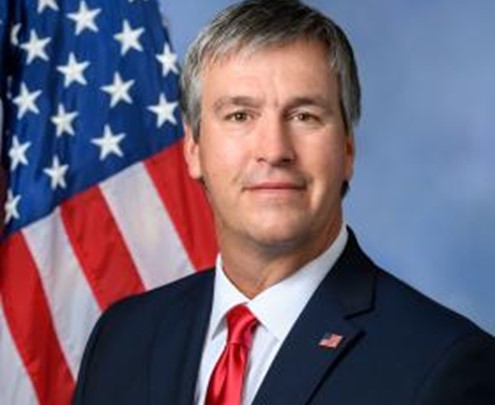AG Steve Marshall Announces $276 Million in settlements with opioid manufacturers, distributor

Attorney General Steve Marshall announced today that the State has reached settlements with two pharmaceutical manufacturers and one pharmaceutical distributor totaling $276 million to resolve the State’s lawsuit for their role in exacerbating the opioid crisis in Alabama. The settlement funds are to be used to remediate the harms caused by the opioid crisis in Alabama. The state government’s share of each settlement will be deposited into the State’s General Fund. The Alabama Legislature will work to determine the best uses of the funds. Legislators will review recommendations from the Alabama Opioid Overdose and Addiction Council to determine the State’s greatest needs. The Council was created in 2017 by an executive order of Gov. Kay Ivey, and tasked with developing a strategic plan “that establishes recommendations for policy, regulatory and legislative actions to address the overdose crisis in Alabama.” Marshall stated in a press release, “These three settlement agreements affirm my decision to decline participation in the national opioid settlements, which did not adequately acknowledge the unique harm that Alabamians have endured and would have redirected millions of dollars to bigger states that experienced a less severe impact.” “I am grateful to each member of the Alabama Opioid Overdose and Addiction Council who has put in the time and energy to provide our legislators with a roadmap as they make critical decisions about the use of this money. We envisioned and developed a State plan long before there was any funding to make it a reality, and I am pleased that we can finally put our plan to good use.” The breakdown of the settlements follows: • Endo Pharmaceutical: The State of Alabama and its subdivisions will receive $25 million this year in a lump-sum payment. Pursuant to an agreement between the State and its litigating subdivisions, the State will receive $15 million, less attorneys’ fees, and its litigating subdivisions will receive $10 million. • Johnson & Johnson: The State of Alabama and its subdivisions will receive $70.3 million this year in a lump-sum payment. While the State would have received this same amount in the national settlement, it would have been paid out over nine years. The settlement funds will be split 50/50 between the State and its subdivisions. • McKesson: The State of Alabama and its subdivisions will receive $141 million over nine years. Under the national settlement, the State would have received only $115.8 million, paid out over eighteen years. The settlement funds will be split 50/50 between the State and its subdivisions. In addition to monies for remediation, the State received approximately $40 million in attorneys’ fees and costs for the State and its subdivisions. The State has remaining claims against opioid manufacturers Purdue Pharma, Mallinckrodt, and Insys in each of their respective bankruptcy cases. Marshall concluded, “Having encountered the utter darkness of the opioid crisis at my own doorstep, this is one of my most meaningful accomplishments as your Attorney General.”
Toyota invests $222 million to expand engine production in Alabama

Toyota announced plans to invest $222 million at its manufacturing facility in Huntsville to create a new production line for four-cylinder engines, including a hybrid-electric version, reported Made in Alabama. The project is part of a larger plan that includes Kentucky, Missouri, and Tennessee plants. “When it comes to vehicle powertrains, Toyota customers want options that are fuel-efficient and electrified,” said Norm Bafunno, senior vice president for Unit Manufacturing and Engineering for Toyota. “These investments allow us to meet customer needs and quickly respond to an evolving market. We are committed to investing in the U.S., and our teams are ready to take on this new challenge.” The Huntsville plant is among Toyota’s largest engine facilities and the automaker’s only one in the world to build 4-cylinder, V-6, and V-8 engines under one roof. It has produced 8 million engines since the facility opened. This newest investment will allow the plant to expand by 144,000 square feet. It will create a new four-cylinder production line and produce engines for both combustion and hybrid electric powertrains. Gov. Kay Ivey applauded the announcement and said the investment would help Alabama in the future. “Toyota has been a great partner for Alabama, and its expansion projects at the Huntsville engine plant have always played an important role in the world-class automaker’s growth plans,” Ivey stated. “This significant new investment in Alabama will once again help power Toyota’s strategic efforts to prepare for the future in a fast-changing industry.” Greg Canfield, Secretary of the Alabama Department of Commerce, stated, “Toyota has become a pillar in Alabama’s automotive industry over the past two decades, and this latest milestone represents another important development in the automaker’s strategic growth plans for the Huntsville facility.” Huntsville mayor Tommy Battle expressed appreciation for the investment, stating on Twitter, “The Toyota Motor plant in North Huntsville is expanding again! Starting soon the facility will receive a $222M investment to create 114,00 sq ft of new space that will house a production line making 4-cylinder engines for hybrid cars. Toyota is one of our most valued partners.”
Florida judge voids U.S. mask mandate for planes, other travel

A federal judge in Florida struck down the national mask mandate covering airlines and other public transportation Monday, and the Biden administration said the rule would not be enforced while federal agencies decide how to respond to the judge’s order. The ruling appeared to free operators to make their own decisions about mask requirements, with several airlines announcing they would drop mandates but New York City’s public transit system planning to keep one in place. The Association of Flight Attendants, the nation’s largest union of cabin crews, has recently taken a neutral position on the mask rule because its members are divided about the issue. On Monday, the union’s president appealed for calm on planes and in airports. “The last thing we need for workers on the frontlines or passengers traveling today is confusion and chaos,” union leader Sara Nelson said. Nelson said it takes airlines 24 to 48 hours to put new procedures in place and tell employees about them. She said passengers should check with airlines for updates about travel requirements. The decision by U.S. District Judge Kathryn Kimball Mizelle in Tampa, an appointee of former President Donald Trump, also said the U.S. Centers for Disease Control and Prevention failed to justify its decision and did not follow proper rulemaking procedures that left it fatally flawed. In her 59-page ruling, Mizelle said the only remedy was to vacate the rule entirely across the country because it would be impossible to end it for the limited group of people who objected in the lawsuit. The judge said “a limited remedy would be no remedy at all” and courts have full authority to make a decision such as this — even if the CDC’s goals in fighting the virus are laudable. The Justice Department declined to comment when asked if it would seek an emergency stay to block the judge’s order. The CDC also declined to comment. The White House said the court ruling means that for now the mask order “is not in effect at this time.” “This is obviously a disappointing decision,” White House press secretary Jen Psaki told reporters. “The CDC is recommending wearing a mask on public transit.” The CDC had recently extended the mask mandate, which was set to expire Monday, until May 3 to allow more time to study the BA.2 omicron subvariant of the coronavirus now responsible for the vast majority of cases in the U.S. In New York, Metropolitan Transportation Authority communications director Tim Minton said the system was “continuing to follow CDC guidelines and will review the Florida court order.” The MTA operates New York City buses and subway trains as well as two commuter rail lines. Face coverings have been mandatory on all trains and buses since early in the pandemic. United Airlines said in a statement that, effective immediately, masks would no longer be required on domestic flights or certain international flights. “While this means that our employees are no longer required to wear a mask – and no longer have to enforce a mask requirement for most of the flying public – they will be able to wear masks if they choose to do so, as the CDC continues to strongly recommend wearing a mask on public transit,” United said. The federal mask requirement for travelers was the target of months of lobbying from the airlines, which sought to kill it. The carriers argued that effective air filters on modern planes make transmission of the virus during a flight highly unlikely. Republicans in Congress also fought to kill the mandate. Critics have seized on the fact that states have rolled back rules requiring masks in restaurants, stores, and other indoor settings, and yet COVID-19 cases have fallen sharply since the omicron variant peaked in mid-January. There have been a series of violent incidents on aircraft that have mainly been attributed to disputes over the mask-wearing requirements. The lawsuit was filed in July 2021 by two plaintiffs and the Health Freedom Defense Fund, described in the judge’s order as a nonprofit group that “opposes laws and regulations that force individuals to submit to the administration of medical products, procedures, and devices against their will.” Republican Florida Gov. Ron DeSantis, who was not directly involved in the case but has battled against many government coronavirus requirements, praised the ruling in a statement on Twitter. “Great to see a federal judge in Florida follow the law and reject the Biden transportation mask mandate. Both airline employees and passengers deserve to have this misery end,” DeSantis tweeted. Republished with the permission of the Associated Press.
AG Steve Marshall files multiple lawsuits to uphold Trump administration border policies

Attorney General Steve Marshall last week filed briefs in two major lawsuits aimed at blocking the Biden administration from scrapping two border protection measures initiated by former President Donald Trump. The legal actions seek to uphold both the “Remain in Mexico” and “Title 42” programs. “Two lower courts held that the Biden administration violated federal law in how it suspended the Remain in Mexico policy, and I joined a brief urging the U.S. Supreme Court to uphold those decisions,” said Attorney General Marshall. “The Remain in Mexico policy has been a vital means of protecting Alabama and other states from the growing surge of illegal aliens from the nation’s southern border,” Marshall stated in a press release. “Furthermore, I have filed a motion for a preliminary injunction to prevent the Biden administration from hastily ending enforcement of Title 42, which since March 2020 has provided the Department of Homeland Security (DHS) additional authority to remove aliens attempting to cross the border. Though repealing Title 42 would lead to an even greater influx of illegal immigration that DHS is not presently equipped to handle, the Biden administration has pressed forward nonetheless. “While his own Homeland Security secretary has said the border situation is ‘worse now than it, frankly, has been in at least 20 years, if not ever,’ Joe Biden has only doubled down on his open borders agenda. He is shelving two of the most successful programs for keeping our borders secure. Biden dropped enforcement of Remain in Mexico on his first day in office and the result was a surge in border encounters from 78,000 in January 2021 to over 200,000 by July 2021,” Marshall continued. “What’s more, the Biden administration has been releasing unprecedented numbers of illegal aliens all across America – over 750,000 from January 2021 to February 2022. Now, he wants to end the Title 42 measure. Since March 20, 2020, when Title 42 was invoked to protect our borders, it has prevented over 1.7 million illegal entries into the U.S.,” Marshall concluded. Marshall and 18 other attorneys general filed the amicus brief supporting the Remain in Mexico policy on April 14, 2022. Marshall and 20 other attorneys general filed the lawsuit to enjoin the repeal of the Title 42 policy on April 14, 2022.
Report: Low-tax states grow at faster pace than high-tax states

A newly released report examines the tax burden and economic climate of all 50 states and ranks them, with Utah coming in first and New York coming in last. The report, released by the American Legislative Exchange Council (ALEC), says that “cutting taxes, paying down debt and maintaining free-market policies have significantly helped states attract new residents.” “Americans continue to vote with their feet toward states that have lower tax burdens and value economic competitiveness,” said Jonathan Williams, ALEC Chief Economist and Executive VP of Policy. “Rich States, Poor States teaches us that states with lower taxes, especially those that avoid personal income taxes, have seen significantly better rates of in-migration than states with high income tax rates.” The report ranked the states for their economic outlook based on a range of variables, including tax burden, the legal system, the minimum wage, the size of government, the role of labor unions, and public debt. “Generally speaking, states that spend less – especially on income transfer programs – and states that tax less – particularly on productive activities such as working or investing – experience higher growth rates than states that tax and spend more,” the report said. Utah, which has a flat personal income tax, topped the list, followed by North Carolina, then Arizona, Oklahoma, and Idaho. After that, Nevada, Indiana, Florida, North Dakota, and Wyoming filled the 6-10 spots, respectively. “If you believe incentives matter, and I do, state policies have the effect of changing those incentives at both the state and local levels,” economist Arthur Laffer said. “Those changes in incentives have consequences. This ranking of states is a tried-and-true formula. I think it is a great way of picking winners and giving guidance on how states should be effectively governed.” New York fell at the very bottom of the list, with New Jersey ranked 49th and California 48th. The report ranked Vermont 47th, Minnesota 46th, Illinois 45th, Maine 44th, Hawaii 43rd, Maryland 42nd, and Oregon 41st. “This study has had a big impact on what state officials, governors, and legislators are doing,” economic expert Stephen Moore said. “This is a magic moment for tax reform at the state level. I think even in some of these blue states that have been traditionally very liberal, they’re looking at reforms that could really make their states more prosperous. I think the direction is good, and I think a lot of that direction is a result of the Rich State, Poor State rankings.” Republished with the permission of The Center Square.
Katie Britt releases new campaign ad showing Second Amendment support

Republican Katie Britt announced that her campaign has released a new ad in her 2022 bid to serve as Alabama’s next U.S. Senator. Britt, the former chief of staff for the retiring Senator Richard Shelby, is in a close race with Mo Brooks and Mike Durant. The hotly contested Senate seat should have seemingly gone to Brooks, who won the coveted Donald Trump endorsement early on. However, the former president revoked his endorsement of Brooks in March. The ad, entitled “Shoot Straight,” is a 30-second spot that highlights Britt’s staunch support of the Second Amendment. “I’m Katie Britt. Growing up in the Wiregrass, I learned to respect our Second Amendment and always shoot straight,” Britt says in the ad. “As Alabama’s next Senator, I’ll stop Joe Biden’s radical agenda dead in its tracks: reckless spending, job-killing tax hikes, runaway inflation, vaccine mandates, open borders for illegal immigrants, and abortion on demand. I approve this message because I am ready to take on Joe Biden.” “The Second Amendment is a critical check against the timeless tyranny of government,” stated Britt in a press release. “Our Founders wisely knew that the Second Amendment will always be necessary to protect our God-given, inalienable right to defend ourselves, our families, our freedom, our homes, and our communities. As the Biden Administration continues to put law-abiding, hardworking Americans in their crosshairs, we must stand firm and preserve the country we know and love for our children and our children’s children. In the Senate, I will always fight to defend our Second Amendment rights and our Christian conservative values.” Britt is a first-time candidate who has spent most of her career in the private sector, including fighting for small and rural businesses as president and CEO of Alabama’s business council and practicing law. She is a native of Coffee County and now lives in Montgomery with her husband and their two children. According to Emerson College Polling in late March, Durant is currently leading in the Republican Primary with 33%, followed by Britt with 23%, and Brooks with 12%. No other candidate reached double digits. Twenty-six percent of voters are undecided.
Barry Moore introduces HITS Act to cut taxes for Americans

Rep. Barry Moore has introduced new legislation to provide the equivalent of a 6-month Federal income tax holiday for millions of Americans. The Household Income Tax Suspension Act(HITS Act) would stimulate economic recovery by allowing working Americans to keep more of their money Moore argued that creating an income tax holiday would be a more economically sound stimulus policy than fueling inflation through more government spending. For the 2022 tax year, tax filers in the following categories would see their tax liability cut in half. In the case of a joint return or surviving spouse, a gross income of $83,550 or less. In the case of a head of household, a gross income of $55,000 or less. In any other case, a gross income of $41,775 or less. If gross income exceeds these amounts, the tax cut would then be phased out up to the additional amounts below. In the case of a joint return or surviving spouse, $20,000. In the case of a head of household, $13,380. In any other case, $10,000. Moore stated in a press release, “Instead of driving record inflation by printing money that we don’t have in the name of COVID-19 relief, we should cut taxes and let our workforce keep more of their hard-earned money. The answer to providing real relief to millions of Americans is not to weigh down the economy with more spending but to unleash those who power sustainable economic prosperity.” Moore commented on Twitter, “We should be cutting taxes, not paying more for Biden’s failed policies that fuel inflation. That’s why I introduced the HITS Act to provide an income tax holiday for millions of Americans who support the American economy.”


